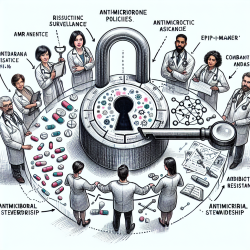The landscape of autism therapy is ever-evolving, and as practitioners, it's crucial to stay informed and implement the latest research findings. The recent article "Clinical Practice Guidelines for Autism Spectrum Disorders" offers a wealth of data-driven insights that can significantly enhance your therapeutic approach. Here's how you can leverage these guidelines to improve your skills and outcomes for children with Autism Spectrum Disorder (ASD).
Understanding the Shift in Diagnostic Criteria
The DSM-5 has redefined autism by grouping various pervasive developmental disorders (PDDs) under the umbrella term Autism Spectrum Disorder (ASD). This shift emphasizes two core domains: social communication and repetitive behavior. Key changes include:
- Inclusion of sensory differences in diagnostic criteria
- Identification of "specifiers" to better understand individual needs
- Recognition of co-occurring mental health disorders like ADHD
Understanding these changes is vital for accurate diagnosis and tailored interventions.
Early Screening and Multidisciplinary Assessment
Early screening is essential for timely intervention. The American Academy of Pediatrics recommends developmental screenings at regular intervals. Tools like the Modified Checklist for Autism in Toddlers (M-CHAT) are invaluable. A multidisciplinary approach involving psychologists, special educators, occupational therapists, and speech therapists ensures comprehensive assessment and care.
Implementing Evidence-Based Interventions
The guidelines recommend several evidence-based interventions:
- Applied Behavioral Analysis (ABA): Effective for improving specific behaviors and skills.
- Social Communication, Emotional Regulation, and Transactional Support (SCERTS): Focuses on child-initiated communication in everyday activities.
- Picture Exchange Communication System (PECS): Helps non-verbal children communicate using pictures.
Incorporating these interventions into your practice can significantly improve outcomes.
Pharmacological Treatments
While non-pharmacological treatments are the cornerstone of autism therapy, medications can be beneficial for managing severe symptoms. Atypical antipsychotics like risperidone and aripiprazole are effective for reducing irritability and hyperactivity. However, these should be used as part of a broader, individualized treatment plan.
Psycho-Education for Families
Educating families about autism is crucial. Key points to communicate include:
- Autism is a neurodevelopmental disability that starts in utero.
- Early intervention is beneficial.
- Autism is not caused by vaccines or bad parenting.
Providing support and resources to families can help them navigate the challenges of raising a child with autism.
Encouraging Further Research
The guidelines highlight areas where further research is needed, such as the effectiveness of new pharmacological treatments and the role of genetic factors. Staying updated with ongoing research will help you provide the best care possible.For a more in-depth understanding, I highly recommend reading the original research paper. To read the original research paper, please follow this link:
Clinical Practice Guidelines for Autism Spectrum Disorders.










